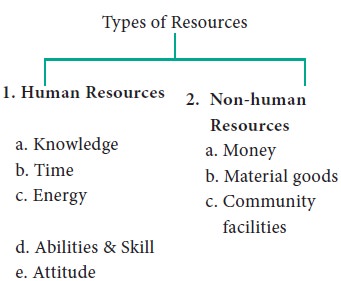Types, Characteristics | Family Resource Management - Family Resources: Types and Characteristics | 11th Home Science : Chapter 7 : Family Resource Management
Chapter: 11th Home Science : Chapter 7 : Family Resource Management
Family Resources: Types and Characteristics
FAMILY RESOURCES
Resources can be defined as anything we use to achieve what we want (our goals). In other words, they are the materials and human attributes which satisfy our wants.
Types of Resources

1. Human Resources: These are the
ca-pacities and characteristics of an indi-vidual. These can be used only by
the person who possesses them. They have the high potential to achieve what we
want and many a times may not be cul-tivated or made available. Most of the
time, families underestimate these re-sources and are unaware of them.
i.
Knowledge: It is important to be
aware of things to be able to achieve what we want. If we want to buy
a T.V. we need to know what features to look for, brands available. This will
help in buying a better quality product.
ii.
Time: It is constant for
everyone, 24 hours a day. The way a
person man-ages and uses her time is her per-sonal choice. A student may finish
all the work before going to play; another may waste his time watch-ing
television or talking on the cell phone.
iii.
Energy: This is both mental
and physical power of a person. To achieve goals, one needs to plan,
organise and finally implement the plans. This would require both mental and
physical energy.
iv.
Abilities and skill: These are inher-ited
and acquired. These may include skills like cooking, decorat-ing, gardening.
Each individual has particular abilities with which he/ she can achieve his/her
goals. These skills can also be developed by sys-tematic learning and practice.
v.
Attitude: These are opinions or
feel-ings a person has towards a thing which may hinder or help in achiev-ing
his goals. A positive attitude may help a person achieve what he wants whereas
a negative attitude may hin-der her in achieving what she wants.
2. Non-human Resources: These are tools and assets that families have at their dis-posal to achieve what
they want. These are available for everyone to use. A per-son works hard and
earns money to be used by him and his family. He/she may buy material goods or
land from this money and may build a house on this land. Community facilities
like banks, post offices, parks, and library. These are tangible and are more
identifiable.
a. Money: It is the pivotal
resource which can be exchanged to buy material things, commodities and
services. It can also be used for future use and thus gives a sense of security
to the family.
b. Material goods: These include durable goods or perishable goods used and owned by a family in
their everyday use. Land, house, furniture and vehicle are examples. These help
to make life easier and more comfortable for all family members. Durable goods
like land can also help families to earn or save money. If vegetables are grown
on land, the family can save money on buying vegetables or sell these
vegetables to earn money.
c. Community facilities: These are those facilities which are common for all members of a
community. Parks, libraries, post office, police and fire protection, banks,
hospi-tals, transport facilities, roads, rail-ways, electricity, water supply,
mar-kets, community centres and ration shops are examples of community
facilities. All families can avail these facilities without directly paying for
them but indirectly pay-ing for them through taxes.
Characteristics of Resources
1. All resources are useful and all help to achieve goals.
One cannot call energy or time as a resource
if it is wasted or not used. If a piece of land is lying vacant, it is not a
resource, only when a family grows vegetables on it, does the land become a
resource.
2. All resources are limited.
There is a limit to a person’s knowledge,
skill, energy, material goods and money available to the family.
3. All resources are inter-related.
A resource cannot be used in isolation. If a
homemaker has to go to the market, she will use her knowledge, skill of
bar-gaining, time, energy, money, market and transport to achieve this goal.
4. Resources can be substituted.
One can exchange one resource for another. A
family uses time, skill and energy of a servant and gives her money in
exchange. Similarly, material goods can be bought in exchange of money. One can
exchange knowledge by paying tuition fees.
5. All resources need to be managed.
Since all resources are limited, they need to
be utilized properly, otherwise they may be wasted. Time and energy have to be
managed by work simplification tech-niques, proper postures and labour saving
devices.
Related Topics